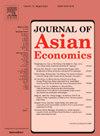Local governmental environmental responsibility and corporate greenwashing: Quasi-experimental evidence from China
IF 2.9
3区 经济学
Q1 ECONOMICS
引用次数: 0
Abstract
The issue of greenwashing in Environmental, Social, and Governance (ESG) disclosure has addressed global concerns in recent years. However, how external stakeholders help alleviate greenwashing remains largely unclear. To explore this question, we adopt a difference-in-differences (DID) approach to study the effect of Natural Resources Accountability Audit (NRAA) on corporate greenwashing behavior. Drawing on the heavily polluting enterprise dataset over the period 2011–2021, this study shows that the implementation of NRAA significantly reduces greenwashing practices and ensures the reliability of corporate ESG disclosure. Intuitively, we find that environmental accountability of local government eliminates corporate greenwashing through stimulating more site visit of institutional investors, revealing the importance of external governance in shaping corporate strategies. Further analysis on corporate environmental irresponsibility verifies that enterprises curtail greenwashing practices for their pursuit of legitimacy. Additionally, this study reveals that NRAA performs more effectively for state-owned and politically connected enterprises and those in regions with a high level of marketization. The conclusions serve to extend signaling and legitimacy theory, supplying valuable implications for corporate ESG disclosure.
地方政府环境责任与企业洗绿:来自中国的准实验证据
近年来,环境、社会和治理(ESG)披露中的“漂绿”问题引起了全球关注。然而,外部利益相关者如何帮助减轻“漂绿”在很大程度上仍不清楚。为了探讨这一问题,我们采用差异中的差异(DID)方法来研究自然资源问责审计(NRAA)对企业洗绿行为的影响。利用2011-2021年期间的重污染企业数据集,本研究表明,NRAA的实施显著减少了“洗绿”行为,并确保了企业ESG披露的可靠性。我们直观地发现,地方政府的环境问责通过刺激更多机构投资者的实地考察,消除了企业的“漂绿”现象,揭示了外部治理在企业战略形成中的重要性。对企业环境不负责任的进一步分析表明,企业为了追求合法性而减少了“洗绿”行为。此外,本研究还发现,在国有企业和政治关联企业以及市场化程度较高的地区,NRAA的绩效更为有效。这些结论有助于扩展信号和合法性理论,为企业ESG披露提供有价值的启示。
本文章由计算机程序翻译,如有差异,请以英文原文为准。
求助全文
约1分钟内获得全文
求助全文
来源期刊

Journal of Asian Economics
ECONOMICS-
CiteScore
4.70
自引率
9.40%
发文量
90
期刊介绍:
The Journal of Asian Economics provides a forum for publication of increasingly growing research in Asian economic studies and a unique forum for continental Asian economic studies with focus on (i) special studies in adaptive innovation paradigms in Asian economic regimes, (ii) studies relative to unique dimensions of Asian economic development paradigm, as they are investigated by researchers, (iii) comparative studies of development paradigms in other developing continents, Latin America and Africa, (iv) the emerging new pattern of comparative advantages between Asian countries and the United States and North America.
 求助内容:
求助内容: 应助结果提醒方式:
应助结果提醒方式:


